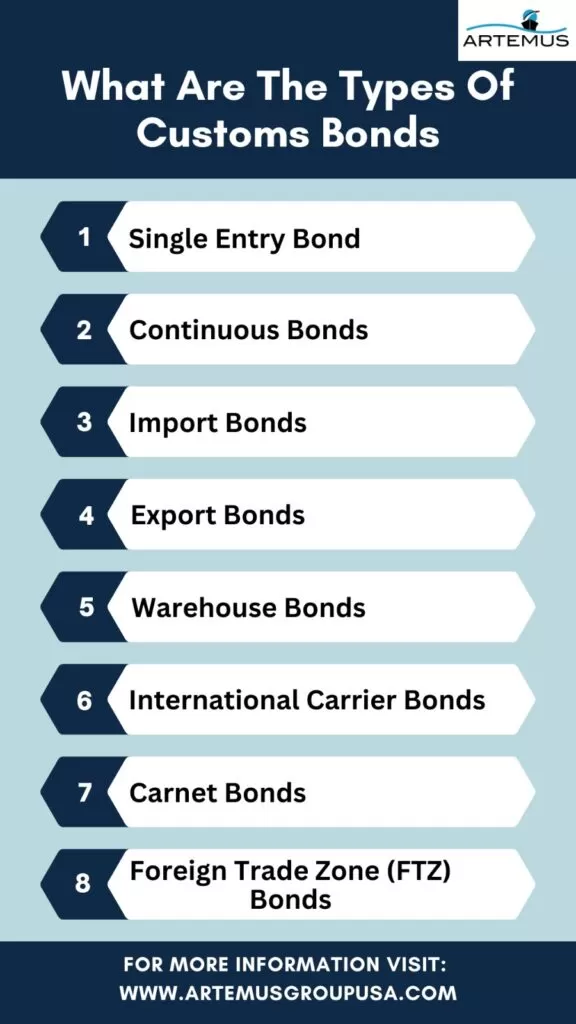
What Is Inbound Logistics & Outbound Logistics? A 2025 Guide
In the dynamic world of supply chain management, understanding the nuances of inbound and outbound logistics is crucial for operational

In the vast and intricate landscape of international trade, there exist numerous regulations and requirements that businesses must navigate to ensure smooth operations. Among these regulations, Customs Bonds stand as a crucial but often misunderstood component. Whether you are a seasoned importer or a newcomer to the world of global commerce, understanding Customs Bonds is essential for ensuring compliance with the law and the seamless flow of your goods across borders.
In this comprehensive guide, we will delve deep into the world of Customs Bonds, shedding light on what they are, why they are essential, and how to obtain them. We will explore the different types of Customs Bonds, and the key players involved, and demystify the intricacies surrounding their cost. Moreover, we will share easy steps to help you secure a Customs Bond tailored to your unique needs.
Moreover, Artemus offers cutting-edge ISF (Importer Security Filing) and AMS (Automated Manifest System) software solutions, revolutionizing the way businesses navigate the labyrinth of customs regulations.
Table Of Contents
A customs bond is a financial arrangement designed to ensure compliance with customs regulations and cover potential financial losses that may arise during the importation or exportation of goods. When goods are brought into a country or shipped out, customs authorities may require importers, exporters, or other relevant parties to obtain a customs bond as a form of guarantee. This bond serves as a contractual agreement between the bonded party, a surety company, and the government customs agency.
The primary purpose of a customs bond is to guarantee that the obligated party will fulfill their legal obligations related to the import or export process. These obligations include payment of customs duties, taxes, and other fees, as well as adherence to regulatory requirements. If the bonded party fails to meet these obligations, the customs authorities can make a claim against the bond to recover the owed amounts.
Customs bonds come in various types, each catering to specific scenarios such as temporary importations, transportation of goods within a country’s borders, or continuous import/export operations by businesses. Overall, customs bonds play a crucial role in facilitating international trade by ensuring that parties involved adhere to customs regulations and fulfill their financial responsibilities.
Related: Customs Bond Renewal: All Facts You Need To Know

Customs bonds come in various types, each serving specific purposes within the realm of international trade and customs regulations. One of the most common types is:
1. Single Entry Bond covers a single import transaction and ensures that the importer fulfills their financial obligations for that specific shipment. It guarantees payment of duties, taxes, and fees associated with imported goods. Once the payment is made, the bond’s coverage for that particular transaction is considered fulfilled.
2. Continuous Bonds are also known as Annual Bonds. These bonds provide coverage for multiple shipments throughout a specified period, usually a year. Continuous bonds are beneficial for frequent importers who handle multiple shipments annually, as they eliminate the need to obtain a separate bond for each transaction. They offer convenience, streamlining the import process and reducing paperwork.
Aside from these bonds, there are specialized bonds tailored to specific circumstances:
1. Import Bonds: These bonds ensure that importers will fulfill their financial obligations, including the payment of customs duties, taxes, and fees associated with the imported goods.
2. Export Bonds: Exporters may need these bonds to ensure that they follow regulations and fulfill obligations related to exporting goods, such as providing accurate documentation and complying with trade restrictions.
3. Warehouse Bonds: When goods are stored in a bonded warehouse before they’re released for domestic consumption or export, a warehouse bond guarantees that the necessary duties and fees will be paid when the goods are eventually removed from the warehouse.
4. International Carrier Bonds: Commonly used by carriers such as airlines and shipping companies, these bonds ensure that transportation companies will comply with customs regulations and properly report and deliver goods.
5. Carnet Bonds: These bonds are used for ATA carnets, which are international customs documents allowing the temporary import of goods for various purposes like exhibitions or trade shows. The bond ensures that the goods will be re-exported within a specified time frame.
6. Foreign Trade Zone (FTZ) Bonds: Goods brought into a foreign trade zone can be stored, manipulated, or processed without being subject to duties until they’re officially imported into the country. FTZ bonds guarantee that the goods will eventually be properly imported or exported.
Related: ISF Filing Process: A Detailed Step-By-Step Guide

The purpose of a customs bond is to ensure compliance with customs regulations and guarantee the fulfillment of financial obligations related to the importation or exportation of goods. Customs bonds serve as a critical mechanism to facilitate international trade by establishing a financial commitment that safeguards the interests of both governments and trading parties.
By requiring a customs bond, customs authorities aim to minimize the risk of non-compliance with regulatory requirements, such as payment of duties, taxes, and fees, as well as adherence to trade restrictions and documentation standards. The bond provides a financial safety net for the government, ensuring that if an importer, exporter, or other relevant party fails to meet their obligations, the customs agency can make a claim against the bond to recover any owed amounts.
This mechanism promotes accountability within the trade process and discourages fraudulent or irresponsible activities. Furthermore, customs bonds help streamline the flow of goods across borders by instilling confidence in the trading system. They provide assurance to both domestic and foreign stakeholders that the necessary financial commitments will be met, fostering smoother customs clearance procedures and reducing the risk of delays or disputes.
Related: Who Is Responsible For Filing The ISF? Know The Key Roles
A customs bond is a crucial requirement in international trade, ensuring compliance with customs regulations and financial obligations. It is typically required when importing goods into a country. The bond serves as a guarantee that the importer will fulfill their responsibilities, such as paying import duties, taxes, and fees, as well as adhering to relevant trade regulations.
Customs bonds are particularly necessary for high-value shipments to ensure that the correct amount of duties and taxes are collected. Additionally, goods that are subject to specific regulations, such as restricted or controlled items, often require a bond to ensure compliance with these regulations. Temporary imports, where goods will be re-exported after a certain period, also necessitate a customs bond.
Overall, the circumstances that trigger the need for a customs bond revolve around guaranteeing the proper financial and regulatory execution of import transactions. Importers should work closely with customs authorities or experienced customs brokers to determine precisely when a customs bond is required for their specific imports.
Related: What Is ISF Bond? Types, Cost, & Components To Know
A customs bond involves several key players, each with distinct roles and responsibilities in the customs clearance process. These players ensure that goods are imported or exported legally and in compliance with customs regulations. Here are some of the key players in a customs bond:
1. Importer/Exporter: Responsible for initiating customs clearance, providing accurate documents, and paying duties and fees for goods crossing borders.
2. Customs Broker: A licensed expert aiding importers/exporters with customs requirements, documentation, duty calculations, and compliance.
3. Customs Authorities: Government agencies enforcing customs laws, assessing taxes, inspecting shipments, and making clearance decisions.
4. Surety Company: Issues customs bonds, guarantees duty payments, and financially backs obligations on behalf of importers/exporters.
5. Importer of Record (IOR): Ensures compliance with customs rules, even if distinct from the actual importer, often via IOR services.
6. Carrier/Transporter: Physically moves goods across borders, ensuring accurate documentation and compliance with customs rules.
Related: ISF Filing Cost: Elements, Hidden Costs, & Minimization Tips
The amount of a customs bond is typically calculated based on a percentage of the total import duties and taxes that the importer is expected to pay. This percentage can range from 1% to 15% of the total amount, depending on the circumstances. For instance, high-value goods or goods subject to specific regulations might require a higher bond amount.
It’s important to note that customs bond costs are not fixed and can fluctuate based on trade agreements, changes in regulations, and the customs broker you work with. Customs bonds can be obtained from surety companies authorized by the government, and the specific documentation and application process may vary from country to country.
Therefore, the cost of a customs bond varies based on factors like the type and value of imported goods and the regulations of the importing country. It’s advisable to work closely with a customs broker or surety company to determine the exact cost and requirements for obtaining a customs bond for your specific import transactions.
Related: 5 Types Of ISF Penalty & Fines To Know To Avoid Losses
Getting a customs bond is an essential step in ensuring smooth international trade transactions. Here’s a breakdown of the process in six easy steps:
Identify the type of customs bond you need based on your import/export activities. Whether it’s a Single Entry Bond for a specific shipment or a Continuous Bond for multiple transactions throughout the year, understanding your requirements is crucial.
Select a reputable surety company that is authorized to issue customs bonds. Research and compare different providers to find the one that offers the best terms, rates, and customer support.
Complete the bond application provided by the chosen surety company. You’ll need to provide details about your business, financial information, and the specific shipments or activities the bond will cover.
The surety company will assess your application and financial standing. This step involves a credit check and evaluation of your ability to fulfill bond obligations. For Continuous Bonds, this process might take longer due to the ongoing coverage.
Once approved, the surety company will issue the bond document. You’ll need to sign the bond agreement and make the required payment, which is typically a percentage of the bond amount. For Single Entry Bonds, this payment covers the specific transaction. For Continuous Bonds, it’s an annual fee.
Provide the bond document to customs authorities as proof of financial responsibility. This step ensures that your goods can clear customs without delays. Retain a duplicate of the bond for your documentation.
By following these straightforward steps, you can easily obtain a customs bond to facilitate your import/export activities and adhere to customs regulations. Remember that working with experienced customs brokers can provide valuable guidance throughout the process.
Related: ISF Filing Deadline: Timeline, Consequences, & Exceptions
A customs bond operates as a financial assurance to customs authorities, guaranteeing that import duties, taxes, and regulatory obligations will be fulfilled, thereby preventing any potential financial loss to the government.
Importers in the United States are typically required to have a customs bond to facilitate the lawful entry of goods into the country and ensure compliance with customs regulations.
No, customs bonds are generally not refundable once they have been issued and utilized to facilitate import transactions and ensure compliance with customs regulations.

In summary, a customs bond is a pivotal mechanism that upholds the integrity of international trade. Creating a pact of compliance and financial security between importers and customs agencies ensures a smooth exchange of goods while mitigating potential risks. This financial safeguard not only fosters efficient trade processes but also underscores the commitment to adherence and accountability in the complex landscape of global commerce.
Related:ISF Filing Online: A Beginner’s Guide To Your Import Process

In the dynamic world of supply chain management, understanding the nuances of inbound and outbound logistics is crucial for operational

In today’s interconnected world, businesses rely heavily on global trade to expand their markets, access new resources, and drive growth.

Importing goods for resale in the USA presents a lucrative business opportunity, but navigating the complexities of U.S. customs regulations,
Get In Touch
Artemus’ Software Solutions for ISF, AMS, Japan AFR, eManifest Canada, & Panama B2B filings.